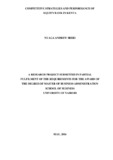| dc.description.abstract | Modern banking sector operates in a dynamic and turbulent environment faced with variety of challenges brought about by competition in the sector. The competition in banking sector has various consequences both positive and negative where firms need to strive to survive, grow and increase market share. Organizations therefore formulate and implement various competitive strategies, extensively evaluate them to yield high firm performance. Competitive strategies developed after carrying out environmental scanning and optimally application of organization core competences well implemented and extensively evaluated yields high firm performance. Competitive strategies leads to competitive advantage which needs to be reviewed via environmental scanning to have sustainable competitive advantage. The objective of study was to investigate the influence of competitive strategies on the performance of Equity bank limited in Kenya. A case study research design was used to handle this research problem. The study involved both primary and secondary data. The researcher used interview guide in data collection. Data was qualitative in nature which was analyzed using content analysis. The study found out that Equity bank limited adopts different competitive strategies like cost leadership strategy, differentiation strategy, focus strategy, combination strategy, mergers and acquisition, strategic alliance, diversification, globalization strategy, innovation and invention strategies and other strategies to outcompete rivals. The research concluded that Porter‟s generic competitive strategies which include combination strategy, cost leadership, differentiation and focus strategy are mostly applied in Equity bank to yield high firm performance. The researcher found out that competitive strategies had high influence on firm performance at Equity bank limited. Positive influence includes banks high quality services, increase in market share, growth and sustainable competitive edge through competitive strategies like diversification strategies where Equity bank had expanded its branches both locally and internationally. The bank had differentiated it products though creativity, inventions and innovations like currently use of Equitel network. High investment in R&D, adoption of technological advancement, inventions and innovations had high cost to organization. The study concluded that Equity bank had invested a lot in technological advancement, inventions and innovations and R&D. Technological advancement included mobile banking using Equitel. Some of inventions and innovations include Bebapay, PayPal, among others. The study concluded that there were different sources of strength which helped bank to gain competitive advantage over rivals like low cost leadership, growth and expansion of branches and agent both locally and internationally that position them above other banks. Such strength may be anchored on quality service, firm‟s image, firm‟s intense investment in R&D, technological advancement, and customer satisfaction level. The study also noted that opportunities also affected bank‟s performance in terms of competence thus bank needs to take advantage of available opportunities in order to outcompete competitors. | en_US |



